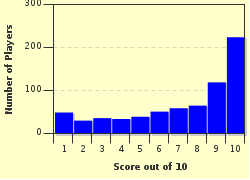Quiz Answer Key and Fun Facts
1. Since we are talking about a carousel, the answer to this question starts with at least one letter from the end of the name of the figure seated in question number 10. The answer to the next question starts with at least one letter from the end of the name of the figure seated in this question, and so on. For example, Elijah might follow Ezekiel on the carousel (Ezeki*EL-EL*ijah).
To whom did the Lord say the following verse?
"Go unto Pharaoh, and say unto him, Thus saith the Lord, Let my people go, that they may serve me" (Exodus 8:1 King James Version)
2. In a dramatic biblical moment, who said these words to his twin brother?
"Feed me, I pray thee, with that same red pottage; for I am faint" (Genesis 25:30 King James Version)
3. The following verse is how we get to know the first king of Israel, and one of the Bible's most tragic figures, for the first time. Who was he?
"... and there was not among the children of Israel a goodlier person than he: from his shoulders and upward he was higher than any of the people." (1 Samuel 9:2 King James Version)
4. Who was the firstborn mentioned below, whom Laban gave to Jacob?
"And Laban said, It must not be so done in our country, to give the younger before the firstborn." (Genesis 29:26 King James Version)
5. Who was the king of Israel referred to in the following verse?
"And Jezebel his wife said unto him, Dost thou now govern the kingdom of Israel? Arise, and eat bread, and let thine heart be merry: I will give thee the vineyard of Naboth the Jezreelite." (1 Kings 21:7 King James Version)
6. Very little is known about this member of the minor prophets. In the following verse, which opens the book bearing his name, we see a very rare outcry on what he perceives as divine injustice. Who was this prophet?
"O Lord, how long shall I cry, and thou wilt not hear! even cry out unto thee of violence, and thou wilt not save!" (chapter 1:2 King James Version)
7. Who was the leader of the following rebellion against Moses and Aaron?
"And they gathered themselves together against Moses and against Aaron, and said unto them, Ye take too much upon you, seeing all the congregation are holy, every one of them, and the Lord is among them: wherefore then lift ye up yourselves above the congregation of the Lord?" (Numbers 16:3 King James Version)
8. Who was the woman quoted below who defended Joshua's spies in Jericho?
"For we have heard how the Lord dried up the water of the Red sea for you, when ye came out of Egypt" (Joshua 2:10 King James Version)
9. To whom did the Lord say the following words?
"Get thee out of thy country, and from thy kindred, and from thy father's house, unto a land that I will shew thee: And I will make of thee a great nation, and I will bless thee, and make thy name great; and thou shalt be a blessing: And I will bless them that bless thee, and curse him that curseth thee: and in thee shall all families of the earth be blessed." (Genesis 12:1-3 King James Version)
10. The following quote is from a book bearing the name of the prophet whose prophecy of wrath revolved around the ill fate of a nation in which social injustice is rooted. Who was he?
"Hear this word, ye kine of Bashan, that are in the mountain of Samaria, which oppress the poor, which crush the needy, which say to their masters, Bring, and let us drink. The Lord GOD hath sworn by his holiness, that, lo, the days shall come upon you, that he will take you away with hooks, and your posterity with fishhooks." (chapter 4:1-2 King James Version)
Source: Author
gentlegiant17
This quiz was reviewed by FunTrivia editor
CellarDoor before going online.
Any errors found in FunTrivia content are routinely corrected through our feedback system.

